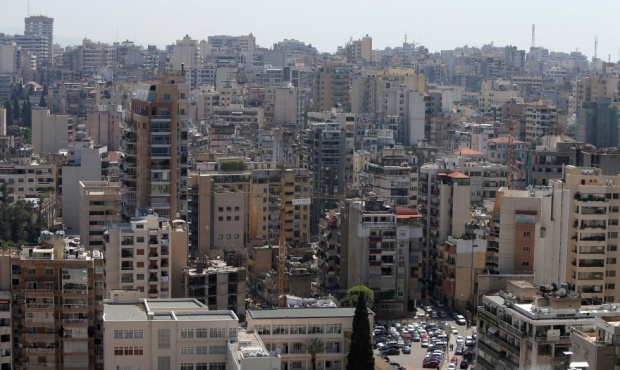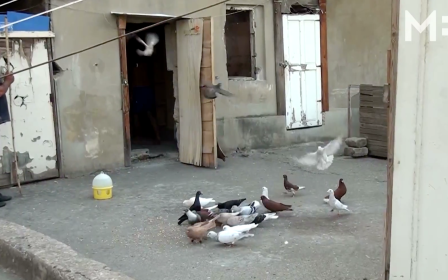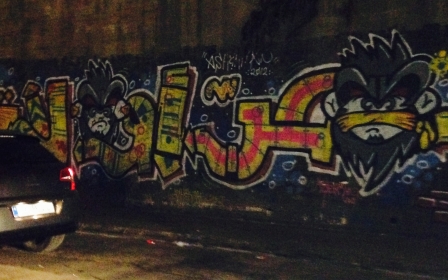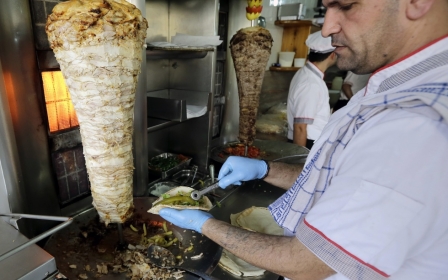Anthony Bourdain in Beirut: Parts still unknown

While employed as US Secretary of Defence under George W Bush, Donald Rumsfeld gave the oratorically challenged president a run for his money with the following statement:
“As we know, there are known knowns; there are things we know we know. We also know there are known unknowns; that is to say we know there are some things we do not know. But there are also unknown unknowns - the ones we don’t know we don’t know.”
It’s perhaps fitting, then, that Rumsfeld recently finagled a mention from Anthony Bourdain, celebrity chef and host of the CNN show “Parts Unknown.” In a dispatch on the CNN website regarding his latest, overly enthusiastic episode about Beirut, Bourdain writes about the Lebanese capital:
“It's a place I've described as the Rumsfeldian dream of what, best-case scenario, the neocon masterminds who thought up Iraq, imagined for the post-Saddam Middle East: a place Americans could wander safely, order KFC, shop at the Gap. Where dollars are accepted everywhere and nearly everybody speaks English.”
In the next paragraph, Bourdain acknowledges that what he has just said is “an egregious oversimplification” - an assessment we can pretty safely file under the category of known knowns.
But there’s still a surplus of unknowns, such as why in god’s name anyone would cast Rumsfeldian dreams in a favourable light or cite the prospect of dollar-based KFC transactions as part of the reason “EVERYONE should visit” Beirut.
Technically, Lebanon is not a “part unknown” to Bourdain, who traveled to the country in 2006 and 2010 with his show “No Reservations.” On the former occasion, his visit was cut short by Israel’s murderous summer assault, when Bourdain and his crew were rescued, along with other American passport holders, by the US military.
The experience, he writes, left him with “a deep love and appreciation for the US Navy and Marines” and the alleged realisation that “the days of ‘happy horseshit’” and superficial food programmes were over: “I … saw that there were realities beyond what was on my plate, and those realities almost inevitably informed what was - or was not - for dinner. To ignore them now seemed monstrous.”
But in the 2006 episode on Lebanon that Bourdain and his team ultimately produced, reality isn’t exactly featured prominently on the menu.
For starters, the whole war is vaguely blamed on Hezbollah despite Israel’s clear role as aggressor - the party responsible for slaughtering approximately 1,200 people in Lebanon, the majority of them civilians.
And nowhere is it specified that the bloodbath was facilitated by rush shipments of weaponry to Israel by none other than the United States of America, the very same entity that sustains Bourdain’s beloved US Navy and Marines - which, it bears mentioning, are complicit in making life hell for many a human population across the globe.
In short, if you want to talk about monstrous, there are plenty of places to start; all that’s required is a willingness to connect the dots.
In Bourdain’s latest segment on Beirut, he appears to be making a concerted effort to look beyond the dinner plate, and much screen time is devoted to discussion of the Lebanese civil war, the 2006 affair, and the machinations of IS. But opportunities for meaningful analysis are largely dispensed with in favour of repetitive marveling at Lebanon’s multisectarian composition, the fact that the sects aren’t constantly killing each other, and the coexistence in one city of Hezbollah and mini-skirts, alcohol and mosques, hijabs and Victoria’s Secret.
Broadcasting his “love” for Beirut, Bourdain makes several curious observations. One is that Lebanon “is fully functioning, more or less” in spite of all the religions - at which point his Lebanese interlocutor reminds him that the country is without a president, a post that has now been vacant for over 13 months due to political squabbling.
Bourdain also suggests that Lebanon is “a democracy,” characterised by a level of freedom that is unparalleled in the region. But billboards of half-naked women do not a democracy make, particularly in a system of institutionalised sectarianism in which folks are forcibly defined according to religious sect and denied the freedom to select a secular identity.
Presiding over the divisive arrangement are Lebanon’s sectarian elite, whose politico-economic flourishing occurs at the expense of the general population. In some parts of the country, the poverty rate exceeds 60 percent.
And while our chef does address the situation of Palestinian and Syrian refugees in Lebanon - many of whom are subjected to gross levels of oppression and discrimination—the fact that Beirut is still portrayed as a magically chaotic wonderland despite the pervasive human suffering therein leaves a bit of a bad aftertaste. “EVERYONE,” we are told, “should visit”. Everyone, that is, with the financial wherewithal to travel to one of the more expensive places on the planet.
None of this is to ascribe malevolent or truth-obfuscating motives to Bourdain, who in 2013 received kudos from the pro-Palestine camp following his excursion to Israel, the West Bank, and Gaza. As Alex Kane puts it at Mondoweiss, the resulting episode offered “a humanised portrait of both Palestinians and Israelis,” complete with a look at the effects of the Israeli siege on Gaza fishermen and at the racism of Israeli settlers.
“For a novice,” Kane writes, “Bourdain provides an interesting and human look at the reality in the region. It’s not perfect, but for CNN, it’s close enough.”
And indeed, “close enough” is as close as we may ever get.
- Belen Fernandez is the author of The Imperial Messenger: Thomas Friedman at Work, published by Verso. She is a contributing editor at Jacobin magazine.
The views expressed in this article belong to the author and do not necessarily reflect the editorial policy of Middle East Eye.
Photo: File picture shows the Lebanese city of Beirut (AFP)
New MEE newsletter: Jerusalem Dispatch
Sign up to get the latest insights and analysis on Israel-Palestine, alongside Turkey Unpacked and other MEE newsletters
Middle East Eye delivers independent and unrivalled coverage and analysis of the Middle East, North Africa and beyond. To learn more about republishing this content and the associated fees, please fill out this form. More about MEE can be found here.





